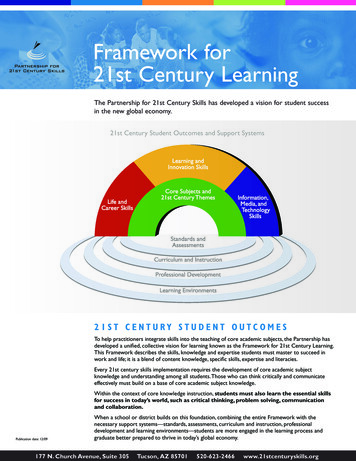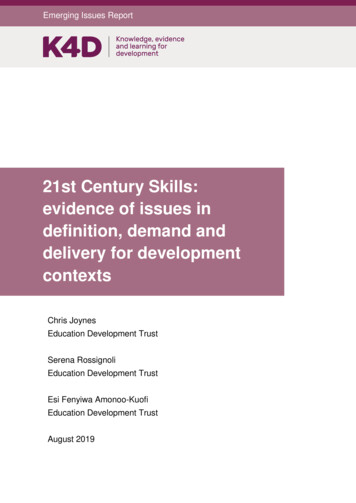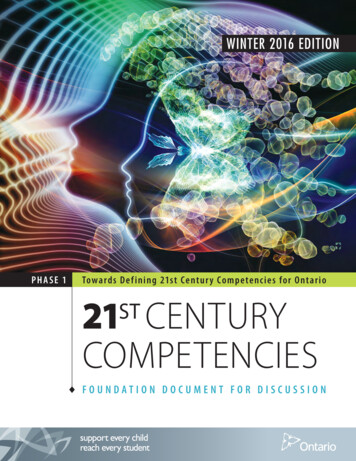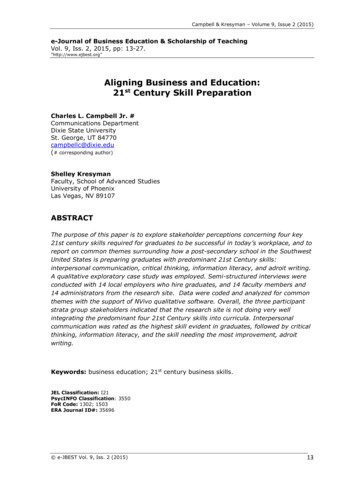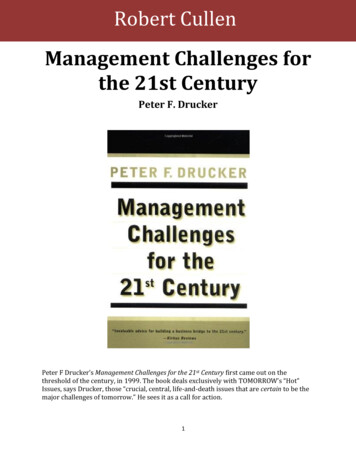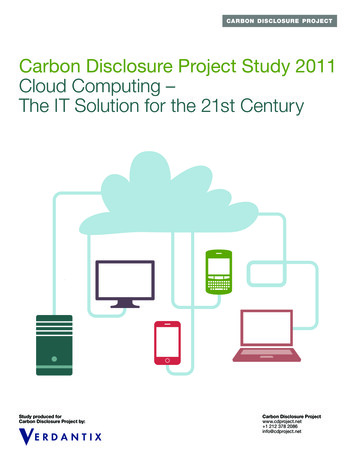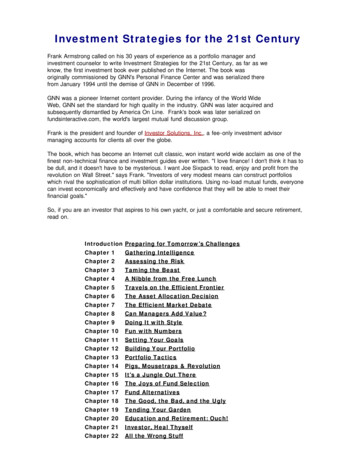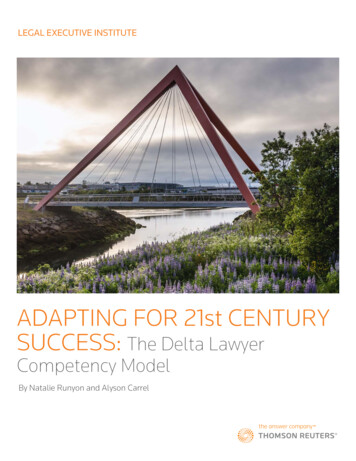
Transcription
LEGAL EXECUTIVE INSTITUTEAdapting for 21st CenturySuccess: The Delta LawyerCompetency ModelBy Natalie Runyon and Alyson Carrel
Adapting for 21st Century Success: The Delta Lawyer Competency ModelExecutive SummaryThe legal education and professional development markets remain largely behind thetimes for providing the skills, training, and competencies required for lawyers to besuccessful in the 21st century, especially amid a legal market that continues to undergotremendous change. The good news is that more and more legal institutions are talkingabout this skills gap and investing in opportunities to offer access to these skills.The Delta Model builds upon the great body of research and work that has been producedon these 21st century skill competencies and seeks to provide an adaptive vehicle forcomprehensive lawyer competence. The Model also works to provide a framework backedby rigorous empirical research that views these skills from the perspective of currentclients and can adapt to their future evolution as well.As a baseline, the Delta Model was created as a concept and then tested against theperspectives of 45 professionals composed primarily of hiring managers of in-housecounsel, hiring managers of outside counsel, and hiring managers of new law schoolgraduates.Key insights gleaned from the research include: The area of Personal Effectiveness competencies is critical to the success ofthe 21st century lawyers, but with variability. Within that larger category, thecompetencies of Entrepreneurial Mindset and Adaptability topped the list, based onsurvey respondents. Emotional Intelligence remains in the Top 3 of attributes cited,according to interview feedback and survey respondents; but was a far second toEntrepreneurial Mindset.“ We envision a legal marketplacewith greater alignment betweenlawyer and client – engendered bya movement toward collaboration,shared vision, and strategicpartnership. This begins with amovement toward agile lawyercompetency models and lawschool curricula that arecontinuously updated based uponfeedback from customers andanalyses of concrete metrics.” Business Fundamentals and Project Management & Workflow were the topcompetencies in the Business & Operations category. There was greater agreement of the most critical competencies – Legal Judgment,Analysis, and Legal Subject-Matter Expertise, in The Law category. There was little variation of the importance of the competencies broadly betweenthe survey participants who were in-house or within a law firm. The Delta Model likely has applications in other allied professional career paths,such as information professionals and legal technologists.The Delta Lawyer Competency model was conceived during a design thinking exercise atthe 2018 working conference, “Legal-Services Quality, Innovation & Technology: Settingan Empirical Research Agenda” that was hosted by Dan Linna (formerly of MichiganState University College of Law’s Legal RnD and now with Northwestern Pritzker Schoolof Law). Attendees came from across the legal industry and included legal technologyinnovators, faculty and students from law schools, and partners at two well-known lawfirms. The Delta Model stemmed from one of the challenges we were asked to tackle: howto bring rigor to assessing the quality of lawyer work through empirically measured value.2
Adapting for 21st Century Success: The Delta Lawyer Competency ModelBackgroundThe legal market is undergoing an undeniable transformation: Clients are demanding more value for lessmoney, while emphasis on the business of law and legal operations is growing. There is still an incompletevision for educating today’s future class of lawyers, and current metrics do not gauge practice-readinessor the ability to meet client expectations. Moreover, average citizens’ access to justice continues to getworse – 50% of the economic middle class and 80% of the lower class do not have ready or affordableaccess to legal services.The solution to these problems cannot be achieved through efficiency initiatives or new technology alone.The foundational paradigm of legal services must shift and indeed, it is. Believing that empirically measuringthe quality of lawyer work offers great untapped value, we wanted to work toward a solution where the clientdefines the quality and value of the work instead of the current measure that values a lawyer by the numberof hours worked or billed.At the same time, many legal experts say the legal industry is at an inflection point resulting from anincreasing pace of change, driven by many factors – technology, client demand, disaggregation of matterworkflow, the rise of millennials approaching mid-career status, and the faster pace of business in general.We envision a legal marketplace with greater alignment between lawyer and client – engendered by amovement toward collaboration, shared vision, and strategic partnership. This begins with a movementtoward agile lawyer competency models and law school curricula that are continuously updated basedupon feedback from customers and analyses of concrete metrics. In this ideal state, treating the trainingand development of lawyers as an investment with measurable returns leads to gains for the business andan increase in job satisfaction for lawyers.The “I” to the “T” to the Delta-Shaped Lawyer Competency ModelFor a long time, good lawyering followed the model of an “I-shaped” professional, focusing almostexclusively on an individual mastering the single competency related to traditional legal knowledge andskills. Before the 2000s, these were the primary skills that were in demand.Figure 1 – The “I-Shaped” Lawyer Competency ModelTHESHAPED LAWYERINCORPORATESLEGALKNOWLEDGELEGALSKILLSThen, following the financial crisis and with the influence of new legal technology, things started to change.Clients increasingly demanded that their lawyers use technology tools and process improvement to enhancedelivery of their legal services. Enter the “T-shaped lawyer,” a term coined by Amani Smathers in 2014.3
Adapting for 21st Century Success: The Delta Lawyer Competency ModelFigure 2 – The “T-Shaped" Lawyer Competency ModelTHEINCORPORATESSHAPED LAWYERDATA & TECHin lawyeringThe inclusion of additional knowledge, skills, and attitudes transformed the “I-shaped professional” into the“T-shaped lawyer.” The stem (or I) of the “T” reflected the legal skills and knowledge learned in law school,and the horizontal cross stroke of the “T” reflected the areas of technology and workflow changes that weremainstreamed in how legal work now is completed. These competencies included such key factors as designthinking, data analytics, technology, project management, and the use of business tools.This “T-shaped lawyer” model gained considerable traction as the only model to represent the need forlawyers to expand their skill set. However, the model was still not one that met two ongoing challenges:1) clients’ demand for better relationship management; and 2) how to empirically measure these qualities.With the rise of artificial intelligence (AI) in the law, we are seeing an increased focus on lawyers’ emotionalintelligence (EI), which is the human side of lawyering. Indeed, the pace of change and the shift of the centerof power to the buyers of legal services adds to the increased demand for improvements in how lawyersrelate to clients. And increased EI makes for better lawyers who can then more effectively act as trustedadvisers for clients.For the purpose of our effort, we adopt the well-known definition of EI as having two parts – self-awarenessand social awareness. Self-awareness is the ability to manage the emotions of oneself and to regulate one’semotions, particularly during stressful situations. Social awareness is the ability to “read” others’ emotionsduring daily interactions through empathy and to adjust the response for effective relationship-building andconflict resolution when necessary.During a one-day working conference in 2018, we hypothesized that a more inclusive model reflectingboth the demands for lawyers to gain skills in technology and the business of law as well as skills related toEI would more comprehensively reflect the diverse skills, attitudes, and knowledge that lawyers need toreach the highest level of client satisfaction. Building off the T-shaped model, we used research literatureand anecdotes to develop a model that included skill sets related to three areas: law, business andoperations, and personal effectiveness skills. We called our creation the Delta Model.We sought to build on the excellent body of work from well-known lawyer education and skills developmentexperts including Bill Henderson, David Wilkins, Alli Gerkman, Amani Smathers, Andrea Schneider, andJim Lupo. We desired to highlight the need not only for T-shaped lawyers, but also for lawyers with highcharacter quotients, emotional intelligence, leadership, and collaborative problem-solving skills.In our analysis of the current state, we discussed the competency models used by firms to evaluate lawyertalent, the many requirements that impact the quality of lawyer work, the relatively new standards fromthe American Bar Association (ABA) requiring law schools to offer experiential learning opportunities, andthe tools of evaluation, such as the bar exam, that certify whether a lawyer meets the requirements topractice law.4
Adapting for 21st Century Success: The Delta Lawyer Competency ModelOur design of the “Delta” Model started with the foundation. We included the foundational LegalKnowledge & Skills that are table stakes for any lawyer passing the bar exam and practicing law. Theseattributes included Legal Research, Legal Writing, and Legal Analysis. This grounded the model with thewidely accepted “lawyering” skills being taught in law schools.Figure 3 – the “Delta Model” of Lawyer CompetencETechnology & Social MediaBusiness FundamentalsData AnalyticsData SecurityDesign & E-DiscoveryProject ManagementnarsoPe&taDa gys,es noloocPr TechlESk ffecill tivsenessEntrepreneurial MindsetEmotional IntelligenceRelationship ManagementCharacterCommunicationLegal Knowledge &SkillsRather than reinvent the wheel, we built off the existing models developed by peers in the legal community.Thus, we chose to include the skills identified in the T-shaped model. These skills include technology,project management, data analytics, and business tools. Technology spending by law firms continues tobe a primary area of investment, underscoring the accelerating pace of change with the ongoing rise of bigdata and workflow technology greatly influencing how lawyering gets done. Moreover, combined with bigunstructured data, AI creates opportunities to analyze siloed data sets to gain insights in numerous newways. We placed these process, data, and technology skills on the right side of our base of foundationallegal skills.But the model at this point remained incomplete. Anecdotally, we observed an increasing number ofclients saying that they wanted their lawyers to reflect a new humanity. Additional research also supportedthe notion that certain skills and character qualities were necessary to succeed in law. Thus, we built thethird side of the model with Personal Effectiveness skills such as Character, Entrepreneurial Mindset, andCommunication. We placed these Personal Effectiveness skills on the left side of the model.Rather than have two uprights on a base, we chose to lean the Personal Effectiveness skills and the Process,Data & Technology skills toward each other forming a triangle with the base. This shape, reminiscent ofthe Greek character delta, gave us the name for the model. Knowing that delta is often used to representchange, this reflected the need for change within the legal field. The placement of the sides also reflects ourobservations that both sides are equally important for a successful 21st century lawyer and that each sidewould function to support the other. Further, the visual draws the eye upward – reflecting our belief thatthese skills are necessary for upward advancement in the legal industry.5
Adapting for 21st Century Success: The Delta Lawyer Competency ModelAn Empirical Research Plan to Assess the Skills toImprove Client SatisfactionIn order to study and back up this otherwise theoretical model, we kicked off a research study in Fall 2018to investigate the skills, attitudes, and knowledge that purport to increase client satisfaction. Moreover,in order to create impactful change in the practice of law and legal education, we believed it was criticalto demonstrate measurable outcomes related to these competencies. We kept our ultimate goal in mind:Highlighting the changing nature of the delivery of legal services, providing a competency model that isbased on empirical research, and ensuring ongoing, critical evaluation of the model and the lawyers whofollow it.The first key step in our research plan was to evaluate the Delta Model and validate the competencies thatwere highlighted. Our longer-term goals were to prepare a menu of professional development options forapplying the Delta Model competencies and identify or create a series of metrics to determine whether alawyer demonstrates the effectiveness of each quality. At the end of 2018, we embarked on Phase One ofour research. During that phase, we conducted interviews with buyers of legal services and law firm talentspecialists to validate the model and prioritize competencies.The insights gained from the interviews were surprising in some ways and not so surprising in others. Wehad hypothesized that Personal Effectiveness skills were as important for a successful 21st century lawyer aswere the skills obtained in law school. This turned out not only to be true, but as some practitioners stated,Personal Effectiveness skills were valued as even more important than those skills typically obtained in lawschool. In fact, many remarked that the “lawyering” skills could be taught, but Personal Effectiveness skillswere more difficult. Indeed, 50% of the top 10 competencies named by our interviewees were classified inthe area of Personal Effectiveness skills. 9 2% of survey respondents cited Relationship Management as a top 10 competency. As one in-houselawyer stated: “Even when you are an in-house lawyer, you are still in client service, which I don’t thinkpeople realize. I still have clients and they get paid by the same company – they don’t pay you.” 8 3% named Communication as a top 10 competency. Respondents noted that “knowing youraudience” was particularly important. In fact, the Chief Human Resources Officer of an Am Law200 law firm indicated that communication is a top development area for the firm, framing it as“understanding your audience and what is right for a particular client or a particular partner that alawyer works with.” 75% named Emotional Intelligence as a top 10 competency. A professional development director in anAm Law 200 law firm said that the self-management part of EI is really critical. “Self-managementis key, and the ability [for any lawyer] to take responsibility for their own behaviors and for their ownwellbeing” at any level is a top 10 competency. 66% named Entrepreneurial Mindset as a top 10 competency. An in-house lawyer offered her view ofwhat this looks like as the willingness of a person to put “their hand up and say, ‘I see a problem and Ihave an idea of how to solve it’ or ‘I heard of this really great tool.’”Our findings in the area of data and technology were more surprising. More specifically, the discussionaround technology was not so much about having expertise in technology but rather “understandingtechnology tools and knowing when to use them.” For this reason, we changed the right-hand side of thetriangle from Process, Data & Technology to Business & Operations. Further, 83% of those we interviewednamed Project Management as a top 10 competency; and 67% of the group named Business Fundamentalsas a top 10 competency. Only 50% of our interviewees named Data Analytics as a top 10 competency.Finally, it was no surprise that the skills learned in law school made it into the top 10. Based on ourinterviews, we separated out Legal Subject Matter Expertise, as many of the individuals we interviewedstressed that staying current on the law and practice areas of expertise were critical for a successful lawyer inthe 21st century. At least 25% of our interviewees stated that skills listed under The Law – the bottom part ofthe Delta – are top 10 competencies.6
Adapting for 21st Century Success: The Delta Lawyer Competency ModelAfter the interviews, we prioritized the competencies found on each side of the triangle. Gathering a broaderrange of perspectives on the Delta Model helped us identify which competencies to include in the model. Weused the critiques to update the model to Version 2.0.In Version 2.0, the base of the model morphed from Legal Knowledge & Skills to The Law, which expandedfrom Legal Research, Legal Writing, and Legal Analysis to include Legal Subject-Matter Expertise. Process,Data & Technology became Business & Operations with key components of Business Fundamentals, ProjectManagement, and Data Analytics. Finally, Personal Effectiveness Skills was renamed Personal Effectiveness.Figure 4 – Delta Model 2.0PERSONALEFFECTIVENESSRelationship ManagementEnrepreneurial MindsetEmotional IntelligenceCommunicationCharacterBUSINESS &OPERAT IONSBusiness FundamentalsProject ManagementData AnalyticsT H E L AWSubject-Matter ExpertiseLegal ResearchLegal AnalysisLegal WritingGraphic used with permission of Alyson Carrel.Graphic used with permission of Alyson Carrel.Surprising Findings in Personal Effectiveness (Again)In early 2019, we initiated Phase Two of the research plan. We designed this phase to gain a wider scope offeedback on the Delta Model. Once again, the findings helped the model to evolve. More specifically: T he Law: Most of the participants indicated that The Law remains the most important category forthe successful 21st century lawyer. P ersonal Effectiveness: 80% of those surveyed found that this was an important skill for clientsatisfaction. B usiness & Operations: 67% agreed that Business & Operations was an important category for clientsatisfaction.7
Adapting for 21st Century Success: The Delta Lawyer Competency ModelThere was also a shift within each category, and the biggest change occurred in the Personal Effectivenesscategory. The top three competencies were: Entrepreneurial Mindset Emotional Intelligence CharacterIn fact, 91% of respondents identified Entrepreneurial Mindset as the top attribute, and 59% and 55%indicated that Emotional Intelligence and Character were the second and third most important for clientsatisfaction, respectively.During the interviews, Relationship Management, Communication, and Emotional Intelligence represented thetop three attributes at 92%, 83%, and 75%, respectively.Figure 5 – Change in Personal Effectiveness Category% of RespondentsSaying it is a TopAttributePersonal EffectivenessAttribute from InterviewsPersonal EffectivenessAttribute from Surveys% of RespondentsSaying it is a TopAttributeRelationship Management92%Entrepreneurial Mindset91%Communication83%Emotional Intelligence59%Emotional Intelligence75%Character55%An entrepreneurial mindset points to the need for agility and adaptability for the success of lawyers in the21st century and as a way to expand problem-solving beyond solely legal issues. Indeed, more than 60%(20 out of 33) of respondents classified proactive problem-solving as extremely important on a 1-to-10 scalewithin the Entrepreneurial Mindset competency of the left-hand side of the Delta.Figure 6 – Proactive Problem-Solving20/33of respondents classified proactiveproblem-solving as an extremelyimportant skill for lawyer successA key lawyering skill is the ability to craft arguments that find gaps, loopholes, or an alternative perspectiveon legal issues – legal issue problem-solving. However, this problem resolution paradigm applies primarilyto strictly legal issues and is largely reactive. Perhaps the key word in this question was “proactive” becauseidentifying a legal argument is reactive. Moreover, necessitating the possibility of reframing legal work asproblem-solving enables the agility of the skill in other areas of the profession.We note with interest the fluctuation of Emotional Intelligence from the top 3 spot in the interview portion ofour research and being at No. 2 during the survey, but with a smaller portion of the survey (59%) indicatingthat Emotional Intelligence was a top 2 attribute, compared to 75% during the interviews.One of the other interesting shifts was in the strength of the Relationship Management and the Charactercompetencies in the top 3 categories in the survey results, when during the interviews, they did not emergeas within the top 3.8
Adapting for 21st Century Success: The Delta Lawyer Competency ModelWithin the Emotional Intelligence category, there was a slight favorability for self-awareness, though thesame number of survey respondents selected self-awareness and empathy (15 vs. 15) as extremely important(8 and above on a 1-to-10 scale), but more people (12 self-awareness vs. 7 empathy) selected self-awarenessat a 9 and 10, and 8 vs. 3 respondents rated empathy as an 8 on a 1-to-10 scale, which is critical for theRelationship Management component because of the requirement of Self-Awareness and Empathy to stepinto the shoes of another.Figure 7 – Importance of emotional intelligence areas20151510715750Not important (1-3)Somewhat important (4-7)Extremely important (8-10)EmpathySelf-AwarenessRelationship Management was the No. 1 attribute of those interviewed but not a top 3 in the survey findings,and this is supported by 45% (15 of 33 respondents rating it as an 8-10 on a 1-to-10 scale) of respondentsrating Relationship Management as an extremely important competency.Figure 8 – Relationship Management45%indicated thatrelationship management isan extremely important skillActive Listening in the Communication category and Honoring Commitments in the Character categorywere equally classified as extremely important as a top skill at 54.5% (18 of 33 of all individuals classifyingit as 8 or above on a 1-to-10 scale) of the Personal Effectiveness part of the Delta. Surprisingly, the graphsare identical.Figure 9 – Active Listening and Honoring Commitments Equally ImportantNot important (1-3)Somewhat important (4-7)4Extremely important (8-10)1805Active Listening10152025Honoring Commitments9
Adapting for 21st Century Success: The Delta Lawyer Competency ModelWithin the Business & Operations category (the right side of the Delta), Project Management & Workflowwas selected as the top skill. Next, Business Fundamentals was the second most prioritized competency andfinally, Technology was ranked as the third. Less than one-third ranked Data Analytics as important.Figure 10 – Business & Operations Top-Ranked Attributes201815161410850106441Data AnalyticsTechnology – understandingtech tools and knowingwhen to use themNot important (1–3)14Project Management &WorkflowSomewhat important (4–7)5Business FundamentalsExtremely important (8-10)Within The Law category, there was more consensus in what is considered the top 3 attributes. There is adifferential of 2 respondents between the No. 1 and the No. 3 spot. Legal Judgment was rated at the topspot by 67% (22 out of 33 selecting 8 or above on a 1-to-10 scale) of the individuals; followed by 63% (21 outof 33 selecting 8 or above on a 1-to-10 scale) selecting Legal Analysis as the second most important; and60% (20 out of 33 selecting 8 or above on a 1-to-10 scale) choosing Legal Subject-Matter Expertise as theNo. 3 attribute.Figure 11 – The Law Top-Ranked AttributesImportance of “The LAW”Top-Ranked Attributes67%Legal Judgmentconsidered extremelyimportant63%60%Legal AnalysisLegal SubjectMatter Expertiseconsidered extremelyimportantconsidered extremelyimportant55%Legal Writingconsidered extremelyimportant42%Legal Researchconsidered extremelyimportantOverall, the first phase of research from the Delta Model working group proves two of the three primaryparts of our hypothesis. The first part stated: “We believe that a new delta-shaped model of lawyercompetence, combining currently available research literature and anecdata, will more comprehensivelyreflect the diverse skills, attitudes, and knowledge that lawyers need to reach the highest level of clientsatisfaction.” While The Law remained the most important category, cited by 95% of the respondents, 4out of 5 respondents indicated that Personal Effectiveness was important and two-thirds of respondentsindicated Business & Operations was important.10
Adapting for 21st Century Success: The Delta Lawyer Competency ModelAdaptability of the Delta ModelWe believe the Delta Model has the adaptability to reflect multiple career paths across the legal industry. Asan individual reaches different stages in his or her career, the emphasis on certain skills will change and theweighting of the different components will evolve.The model also can be adapted to reflect a team within an organization. For example, a team at a law firmwill consist of people who excel in the basics of law, such as brief writing. Because a firm has team membersto handle customer relations or client billing, an attorney may not need great skills in business operations.Other team members may carry the weight of certain skills; overall, this could impact the multiple decisionpoints in an individual’s career.The model reflects requirements for well-roundedness of the successful 21st century lawyer – from the lawfirm context, it is the rainmaker; and from the in-house perspective, it is the general counsel who makes keybuying decisions for legal services.We are in the process of developing a new dynamic version of the Delta Model that can shift and change toreflect differing degrees of depth within each competency area. As individuals move through their career,the position they hold or stage of professional development they obtain will be reflected by a changingmodel. Although the component pieces remain consistent throughout, a person’s skill level or need for thosecomponents will shift. With the legal industry at a crossroads between traditional practice and the future ofthe profession, the Delta Model has the agility to bridge the gap.As technology innovates the delivery of legal services, new jobs and positions are being created to harnessthat innovation. For instance, large law firms are now hiring for positions such as a legal solutions architect.Someone in this position must have sufficient depth of skill in the Business & Operations side to truly bevaluable in this position, and a depth of skill that will be deeper than that of a traditional attorney (SeeFigure 12 below).Figure 12 – Delta Model adapted For Legal Solutions ArchitectPERSONALEFFECTIVENESSBUSINESS &O P E R AT I O N ST H E L AWGraphic used with permission of Alyson Carrel.But during Phase Two of our research, one respondent pointed out that law firms still need individuals whoare masterful brief writers and in fact, will look for individuals with that singular expertise. The Delta Modelcan reflect this position as well. By shifting the midpoint higher, we can recognize the greater depth in skillthe individual needs to have in traditional lawyering skills, but must recognize there is still a need for thatindividual to know how to effectively use technology to be efficient in the writing and editing of that brief,11
Adapting for 21st Century Success: The Delta Lawyer Competency Modeland the emotional intelligence to know how to frame issues to be most effective. In this way, the Delta Modelhas the agility to reflect a legal brief writer’s skills (See Figure 13).Figure 13 – Delta Model Adapted for Lawyers with Legal Brief Writing ExpertisePERSONALEFFECTIVENESSBUSINESS &O P E R AT I O N ST H E L AWGraphic used with permission of Alyson Carrel.Likewise, because of how data and technology are driving opportunities to gain new insights from disparate,unstructured data sets, and how information is being used, stored, accessed, and analyzed, professionalroles within the law library are changing dramatically. The 2018 State of the Profession research completedby the American Association of Law Libraries revealed several skills gaps across all three sides of theDelta Model. They included teaching and instruction, emotional intelligence, verbal communication andpresentation skills, legal research, and data management and analytics.Someone in this position must have sufficient depth of skill in the Business & Operations side and thePersonal Effectiveness side to truly be valuable, and the Delta Model offers a visual representation that flexeswith the changing needs and skills for such information professionals (See Figure 14).Figure 14 – Delta Model Adapted For Information ProfessionalsPERSONALEFFECTIVENESSBUSINESS &O P E R AT I O N ST H E L AWGraphic used with permission of Alyson Carrel.12
Adapting for 21st Century Success: The Delta Lawyer Competency ModelFeedback Varies on the Delta Model Between theBuy-Side and the Sell-SidePersonal Effectiveness – When comparing the responses of in-house lawyers versus law firm respondents,priority of most competencies varied along all three sides of the Delta Model. The only exception wasEntrepreneurial Mindset, in that 89% of in-house counsel chose Entrepreneurial Mindset as the No. 1 mostimportant attribute within the category, and 92% of law firm respondents said it was the No. 1 mostimportant attribute.Business & Operations – A full 100% of in-house counsel surveyed chose Business Fundamentals as the keyskill in this category. There was a bit more of a disparity for the law firm respondents, with 75% selectingBusiness Fu
ADApTING For 21st CENTUry SUCCESS: ThE DELTA LAwyEr CompETENCy moDEL 5 our design of the "delta" Model started with the foundation. We included the foundational Legal Knowledge & Skills that are table stakes for any lawyer passing the bar exam and practicing law. these attributes included Legal Research, Legal Writing, and Legal Analysis.this grounded the model with the
